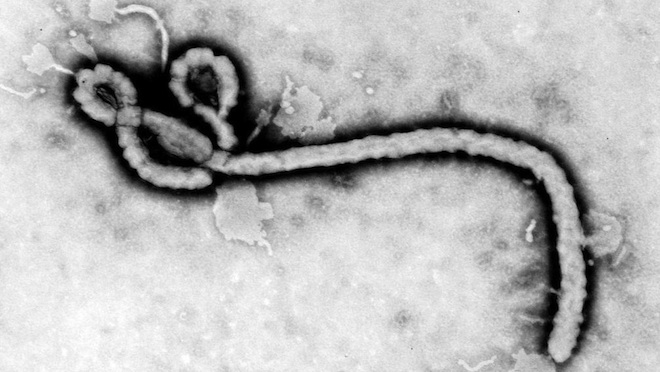Ebola leaves no respite. Guinea announced just two months ago the end of its second Ebola epidemic. It’s today the Ivory Coast neighbor who is on alert.
Ivorian health authorities have identified “a positive case of Ebola virus disease after examination of a sample taken” Friday “on an 18-year-old girl of Guinean nationality”, according to the Ivorian Minister of Health, Pierre Demba.
Severe hemorrhagic fever
Ebola virus disease is a severe hemorrhagic fever, often fatal in humans. Symptoms include feverish fatigue, muscle pain, headache, and vomiting and diarrhea.
The most severe cases lead to kidney and liver failure and internal and external bleeding (bleeding gums, blood in the stool). The mortality rate is on average 50%.
An isolated and imported case
The Minister of Health clarified that the young woman had left the town of Labé, in Guinea, by road and was “arrived in Ivory Coast on August 11” last. “This is an isolated and imported case”, he assured Saturday evening on national television RTI.
The patient is “currently in isolation and care at the treatment center for highly epidemic diseases at the University Hospital of Treichville”, in Abidjan.
Emergency vaccination
“We have officially delivered 5,000 doses of Ebola vaccine”, with the support of the World Health Organization (WHO), “to support a rapid response around the case declared by Côte d’Ivoire”, said the National Health Security Agency of Guinea.
Vaccination of “target groups” (front-line health personnel, immediate patient contacts, border security forces) began on Sunday afternoon. The goal is to get as much immunity as possible before the disease can spread.
Reinforced controls
“All arrangements are being made to deal with this situation”, reassured Pierre Dimba. “The sanitary device for the control of the disease exists and has been proven successfully in the past”. The minister also assured that a “intense cross-border collaboration with Guinea” would be in place.
But despite this reassuring speech, “It is extremely worrying that this epidemic has been declared in Abidjan, a metropolis of more than four million inhabitants”, said Matshidiso Moeti, WHO Regional Director for Africa.
“However, most of the global expertise in the fight against Ebola virus disease is located here on the continent, and Côte d’Ivoire can use this experience to accelerate the response.”, she added.
A link with the epidemic in Guinea?
The WHO officially announced, on June 19, the end of the second Ebola epidemic in Guinea. 16 confirmed cases and seven probable cases had been identified in the country in 2021. Eleven patients had survived and 12 had died, according to the WHO.
“There is no evidence that the case detected in Côte d’Ivoire is linked to the recent epidemic outbreak which affected Guinea”, estimates the WHO. “Further investigation and genomic sequencing will identify the strain of the virus and determine if there is a link.”
Early treatment
The worst Ebola epidemic ever recorded dates back to 2016. The disease had killed more than 11,300 people in Guinea, Liberia and Sierra Leone between the end of 2013 and 2016. An undervalued toll, according to the WHO itself . The outbreak of Ebola in a large city like Abidjan could prove disastrous if an epidemic were to break out.
Corn “There is now an effective treatment, and if patients are taken care of at an early stage, their chances of survival improve considerably” recalled the WHO. The next few weeks will therefore be crucial, with close monitoring of contact cases to identify, isolate and treat new patients as quickly as possible.
 Cherry tomatoes contaminated with salmonella: 92 sick and 1 dead
Cherry tomatoes contaminated with salmonella: 92 sick and 1 dead  A better coaching method can make a person grow
A better coaching method can make a person grow  What is the method to prevent diabetes in children?
What is the method to prevent diabetes in children?  What are the effective factors in causing stomach ulcers?
What are the effective factors in causing stomach ulcers?  Why do embarrassing memories seem to appear at night?
Why do embarrassing memories seem to appear at night?  The amazing link between SARS-CoV-2 infection and newly started diabetes
The amazing link between SARS-CoV-2 infection and newly started diabetes  WHO says monkey pox is not a global emergency right now
WHO says monkey pox is not a global emergency right now  Single cell RNA sequencing uncovers new mechanisms of heart disease
Single cell RNA sequencing uncovers new mechanisms of heart disease  Hepatitis of unknown origin: 3 new deaths and 228 cases worldwide
Hepatitis of unknown origin: 3 new deaths and 228 cases worldwide 